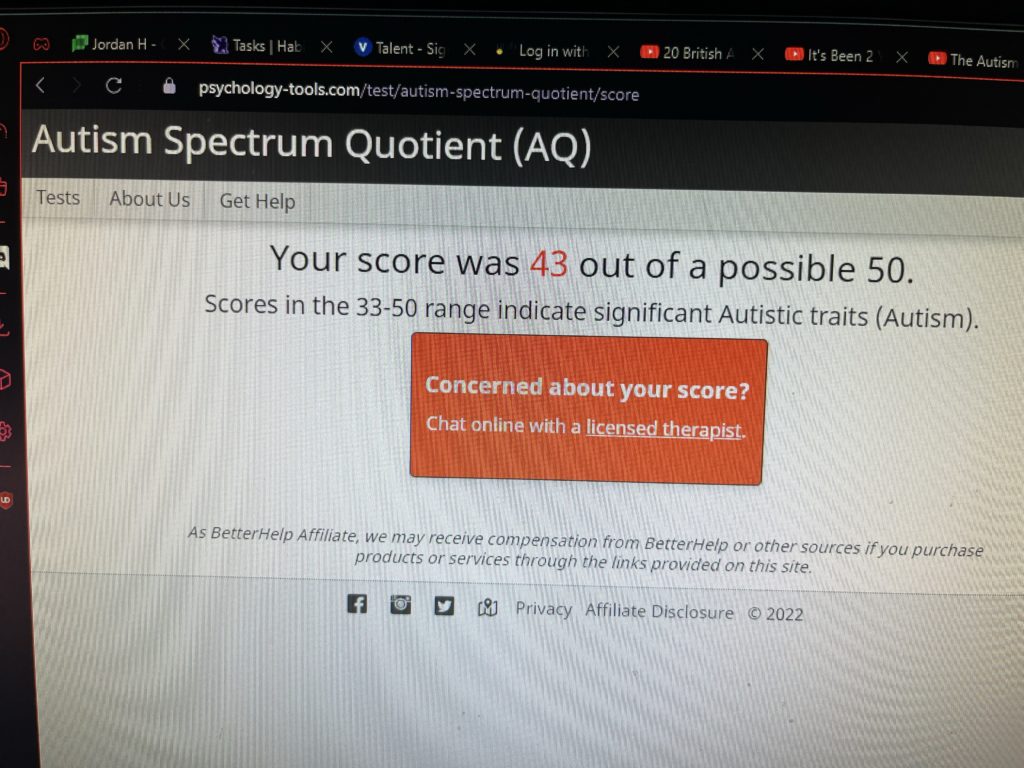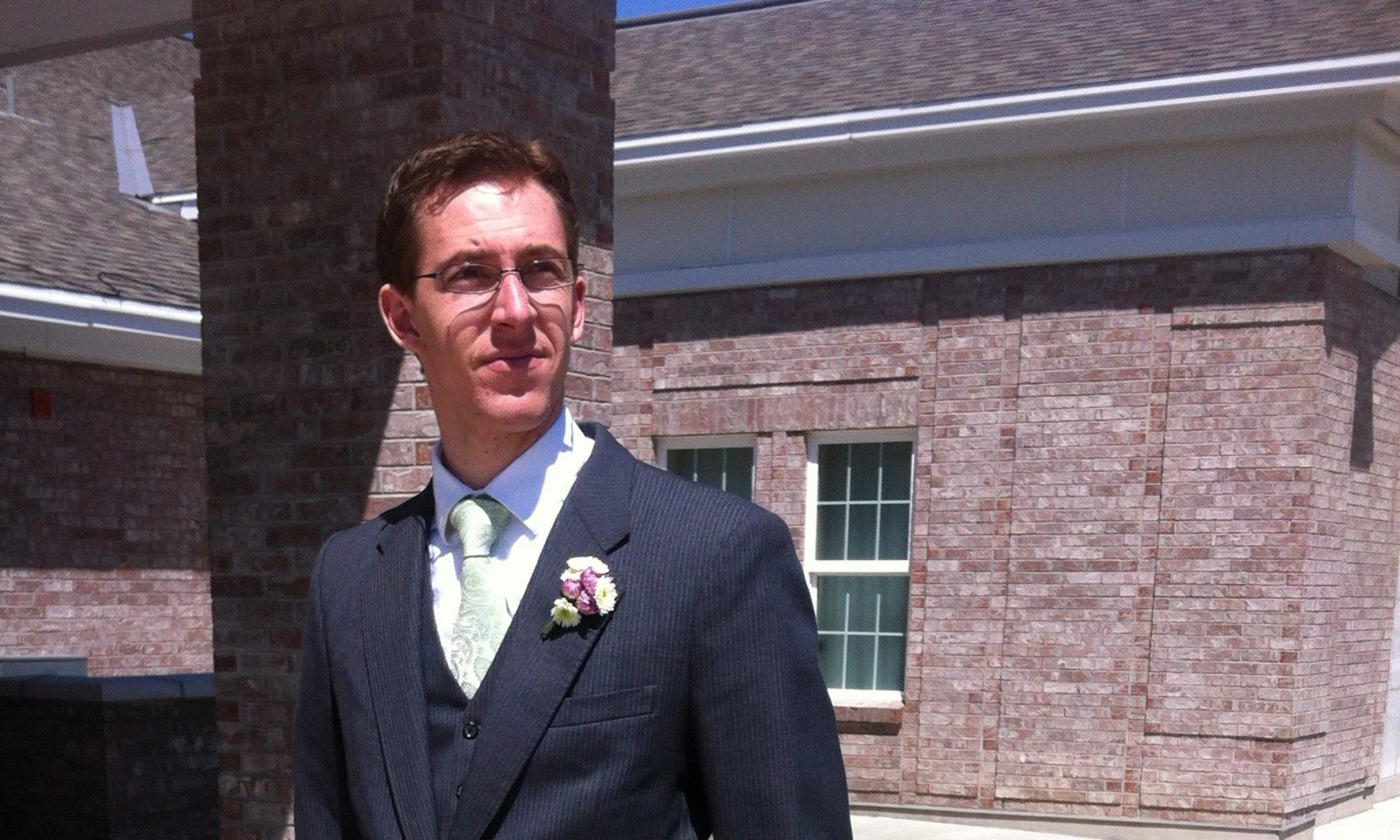
Tl;dr: I’m willing to acknowledge that I’m on the Autism Spectum and it’s a very useful lens to examine my life and understand me better.
This post has been sitting in the verge of my mind for a while. It’s very long, and I don’t expect too many people pointed here to read it. However, because I have as few friends as I do (if I sent you the link, I trust you and would do anything for you, and please understand I think that’s incredibly high praise of a person in general), I thought I might provide some explanation to the few people I know who are willing to put in the time to understand me and to benefit someone who may happen by this place.
It’s going to ramble. There is linked content. I hope this gives some insight into me, and I would love to talk with you about it if you have questions.
That said, if you found this by accident and are here because you don’t know me, please understand everything here is publicly available (I acknowledge that), but just because you know it, that doesn’t mean it’s ok just to jump into the topic in conversation with me. (There’s a warning at the bottom with a little more, and I have a separate post from several years ago about how to use this blog. That post was written to potential dating prospects before I was married, but the same basic conclusions apply to just about everyone.)
Getting started
While we were in Idaho, I watched a video from a guy on YouTube that asked about his own discovery of “why he was a bit odd”:
I’d seen a number of Kyle’s videos before, and much of what he described resonated with my own experience in life and growing up.
Mostly out of jest, I took an online test and the results indicated I might be on the spectrum. This test returned a “probably, but only a little” result.
As I’ve searched for reasons as to why the last few months have gone the way they have, I’ve investigated a number of potential explanations.
But most didn’t fit well.
Yes, I was severely depressed when we left Missouri. Yes, I’ve been severely depressed before. But no psychiatrist or therapist I’ve met with ever thought “depression” as a diagnosis was particularly good.
Yeah it fit. But only partially.
Anxiety was never a really fit. I’m occasionally worried about the future. But it’s relatively controllable. And usually only surfaces in relation to social interactions that I’m particularly concerned about.
The plot thickens
Sometime in the last 7-10 days a video popped on my YouTube feed. I hadn’t really researched anything down the Autism Spectrum for a while, so it came a bit out of left field.
Eric, who is on the spectrum, set out a number of questions to help people get a ballpark whether they might be on the spectrum. His questions are below, with some (lengthy) explanations of my own experience on the topic.
The real me
- Have you always felt different to your peers?
Yes. There has never been a time I can recall where I haven’t been the outsider. Where I wasn’t on the fringe, observing and trying to understand. I’ve always believed I had good ideas, ideas that should be followed, but something always stood in the way of others following me to completion.
So I’ve learned to play the more humble #2 role. The supporter who asks all the important questions and ensures the direction we head is well thought out before going. - Do you worry about ‘not being believed’ when you tell others about yourself?
This isn’t so much a worry as a reality. It’s comes across really conceited when I say “I think 10-1000x more thoughts than other people.” I’ll admit this isn’t the best way to describe it. It’s probably better to say “I think through almost every conversation—all sides—hours and days before they happen.”
This is only a single example, but it’s more approachable and people can understand it more easily than the other. Point being, when I tell people these types of things, I’m simply not believed. And I’m used to it. So the answer is an emphatic yes. - Do you adopt different mannerisms when you are in public? Things you wouldn’t do at home?
This isn’t a behavioral pattern I’ve observed within myself as described in the text of the question alone. I definitely “mask”: I put on a show to seem normal in public, and it’s absolutely exhausting.
This constant output of energy with very little time to recharge or “be me” is very likely what caused my breakdown while teaching and may have been a strong part of my breakdown in Missouri: I was required to be “the guy” in front of everyone all the time, doing things that aren’t in my current natural capacity. (I won’t disallow for the possibility that I could gain these skills or capacities over time, but I certainly don’t have them now.) I have a strong inclination to serve The One.
I don’t do group settings. I don’t do parties. I’m very overtaxed when I’m juggling the needs of many others. But I will do anything for The One. - Do you have ‘gaps’ in your skill set? Some simple things that others do naturally but you can’t?
Yes. This is mostly around social basics. Jokes that are ok in some contexts apparently aren’t in others? I’ve made some giant social errors in my days, and I’ve known for years that it was because I didn’t read the cues around me well. I was missing significant contact.
(I. & C., I’m still very sorry and this autism conclusion doesn’t excuse me at all, just gives me better understanding how I got to the point I did. Of course, you’ll never read this.) - Do you like to be prepared? And dislike last minute changes?
Yes. Emphatic yes. I far prefer to have a plan than not. And when the plan changes—or someone does a thing in the wrong order—I have a hard time not flying off the handle. Over time, I’ve learned to temper this a bit. I’m less tempered on last minute changes.
I have similar reactions to people not following clear directions or trying to do things that are outside (what I think is) the obvious. This has caused struggles within friendships, marriage, and work. - Are your routines sometimes seen as extreme or odd?
This used to be more the case when I had routines. I’ve not felt like I’ve been very routine-driven for the last several years. But when I had them, yes, many people thought my routines were extreme. (Riding bikes, prepping for races, teaching and coaching.) - Do you like to focus on ONE thing at a time? Because it takes a lot of effort to shift gears?
I used to think I could “multitask” but I can’t. As an example, I can only listen to music without words when I do anything requiring deep though. And even then silence is usually better. Noise canceling headphones at work have been a lifesaver. Keeps me from getting distracted.
But the reality is I can focus on one thing for hours and hours if it is interesting and if it’s worth the time. To the exclusion of all else. But if I don’t have something super interesting I look for every reason to get nothing done.
Deadlines are awesome for me. Ask me to do one thing and I’ll blow it out of the water. Make me choose between several—or make me prioritize myself—and nothing will get done. - Do you go through cycles of hyper productivity? And then burnout?
Yes. Totally. I have hours to weeks of hyper productivity. Not in a manic way. I still do other things and can convince myself to rest. But there are often crashes. And I’ve just learned to deal with it. This cycle (again) is most obvious on teaching school and my crash in Missouri. - Do you struggle to hold down a job? Friendships? Relationships?
I’ve never concluded that I have troubles holding down jobs. But I’ve never stayed anywhere longer than the five years I was with Anglepoint. And that felt like a long time. Through college I had 2-3 jobs plus classes at any given time. So maybe I do.
I certainly have troubles maintaining friendships. Of the three, that is the most obvious. I’ve never understood how people can have more that 4 or 5 close friends. (And I never wanted 20-30 friends I could hang out with at any point. I would consider those acquaintances anyway, which may also show I’m weird.) Lots of friends have gone through my life and very few have stayed.
But I absolutely love and adore those who have. (And again, if I purposely send you here, I would do anything for you, even if you don’t think we were that close.) So I struggle to maintain friendships, and the ones I do have I may hold onto much more tightly than you might expect.) - Do you have trouble expressing what you really mean? Especially under stress?
This used to be a much bigger problem. I gain a lot of communication skills from my experiences and misters in life. The book Crucial Conversations was paradigm shifting for being better able to say what I mean.
I still have problems. Especially when a conversation surfaces I was not expecting. I usually find the right words hours or days later. (In some cases it’s months, after I come back to the conversation in a quiet time.) - Are there some common types of communication you find extremely difficult or uncomfortable?
This kind of falls under the the above. I struggle with groups larger than 5 people. To the point I don’t want to be in social situations where this is the norm. I also found I struggled with the loneliness of remote work. Even with a camera, it wasn’t good. This extends to phone conversations. And I will go 30-90 mins out of my way to have a face to face conversation with you. - Are you sometimes gullible? Struggling to tell whether people are being serious or not?
The way I understand this generally has to do with tone of voice. I don’t really have a problem reading tone this way. Sarcasm and I get along fine. But it may have been an early learned behavior. - Do you often wish that people would ‘say what they mean’? And get angry when they don’t?
Yes. In a number of ways. I don’t like the fact that I’m a dating context there are games people play. I never played them. (Some women may argue I did. But I had no intent to play them.) These dating type games extend to political games within companies. I don’t play them. And they are another reason I left my most recent job.
This also has a different application: I wish people could better explain their motives and intentions. I know why I do almost everything. Even the things I don’t have a reason for at first, I figure out very quickly after having done it. This actually was one of the original areas when I realized I was different from most people and have more thoughts (and reasons) for my actions. I have just barely begun to recognize that most people don’t have reasons for their actions. I just assumed they did. - Are you particularly sensitive (or insensitive) to some things?
Unexpected sounds. Especially in higher frequencies. A breaking class. A siren. A buzzer. Most of these things are useless in my opinion. I’m completely unfazed by cars passing me on the road while riding my bike. And, oddly, car horns in that situation as well. (Even though they match the above.) - Does this lead to significant discomfort in some types of public places? Or in participation in social activities?
I can handle public places well enough. Sometimes it feels that over time my ability to handle these has diminished, but it’s possible that is just because I’m in them less frequently as a result of our ambiguous virus of unknown origins…
I don’t have any of the typical responses associated with people with autism. I don’t need to wear earmuffs or headphones in public. I don’t really have any coping behaviors either. - Do you feel like dealing with the outside world can be difficult and stressful?
I’m not sure I understand the definition of “outside world” so my answer is no. I certainly find dealing with anything outside my own head a challenge. But since that’s literally 100% of the world, I can’t actually be upset about it. - Do you often notice things that others don’t?
I think this is a relatively common human condition, and it’s bi-directional. Where I fail is knowing whether I should say anything about it. As an example: a friend gets a new haircut. I feel no need to say anything. I assume they did it because they wanted to, not because they wanted compliments or to be noticed. I think the common thing is to say something complimentary. But I have an inherent problem with saying things I don’t believe are true. And often a new haircut is shocking, so I don’t like it (or don’t have enough experience with it to have an opinion) so I say nothing.
There are other times I’ll notice little things (not usually about people) which I will tell to my more normal friends (who have some idea how to address the thing with the person I notice it about). And then they go deal with it.
Sorry that’s really ambiguous. Point is, I know I’m not the one who is best fit to handle certain conversations, and I prime someone else with what I noticed to go have the conversation. Applicable at work, home, and with friends. - Are there things that are ‘obvious’ to others that are not obvious to you?
Social ‘rules,’ but we’ve been through it and shouldn’t hash it out again. - Do you have uncommon interests or passions? That others just don’t get?
I’m probably among the most unique people you’ve ever met. My interests are never in the mainstream. I’m going to do things that are way outside your normal comfort zone, and I generally don’t have a problem trying them. I love to nerd out on stuff, and I’m trying to learn to nerd out on more mainstream stuff–stuff people I’m friends with are already interested in–but that’s not really been successful. So I probably just need to make friends (somehow) among people who are already nerding out on the things I’m interested in. - Do you find dealing with people difficult? Or confusing?
Yes. See above - Do you feel like it’s YOUR job to fit in? If you want to make friends?
See the answer to #1. I’m the outsider. It’s my job to fit in enough to sit on the fringe, learn the details I need, and then be able to do my job or whatever needs to be done. - Are you constantly worried about ‘doing the wrong thing’ socially?
Not really. At least I haven’t been for a really long time 7-9 years at least. I’m pretty comfortable with me. I generally (and when I’m in emotional control) understand myself, and whether I was (knew I was?) autistic, I knew how I perceived myself and how I was perceived. So I haven’t really worried too much about doing the wrong thing.
I have recently (maybe last year or so) started to apologize (sometimes ahead of time) for being weird. Or not addressing certain topics the way others might. I’ve found that an ounce of prevention (or warning) staves off all kinds of problems later. - Do you often feel overwhelmed by other people’s emotions? (Or not feel them at all?)
I’m not overwhelmed by others’ emotions. I just generally don’t understand a lot of them. I have no emotional ties to pets or animals. I can’t comprehend that at all. I can conceptually understand that people are emotionally linked to people, but “if it can’t learn to clean up it’s own defecation and eventually hold a conversation with me, I’m not interested it having it.”
(My argument against dogs, btw.)
I know I handle death a lot differently than most people. Just cremate me. Or better yet, compost me. I strongly hold to religious belief that I will see them again. So I don’t really tear up at funerals. I only cried about one of my 2 of my 5 grandparents, and that’s because I had recent experiences with them before they died, and I would regret not having more with them for a while. - Are you often surprised when people tell you what they’ve been thinking or feeling? Because you had no idea?
I was for a long time. This got better after reading Crucial Conversations and just learning to ask people what they were thinking. I know it’s not sexy to ask a question like that, but it’s saved me a lot of confusion over the years. So “not really anymore” but that’s because it’s a learned coping mechanism. - Have you received other labels or diagnoses? That didn’t quite seem to fit?
This is what really hit home at the end. Depression and over-stress were obvious reasons for breakdowns in the past, but they really didn’t explain everything. I’m not really convinced that autism perfectly does. But it gets me a lot closer. I’ve considered bi-polar a bit, but I don’t fit a lot of that, so it fits, but only sort of. The cycling of hyper-productive then crashes described above are a better fit for my experience.
After watching those videos several months apart, I was willing to consider the fact that Autism may very well describe my life experiences.
Ok, but are you really autistic?
In another video, Eric provided links to Simon Baron-Cohen’s (Britain’s most well-known Autism researcher) Autism assessment instrument.
Out of a possible 50, I scored 43.

A friend, on seeing this result rightly asked whether the site providing the test might be more focused on selling therapy services than on actually helping people, but in seeing where the questions came from as well as the peer-reviewed paper in which they were published, she acknowledged that although the sales pitch seems somewhat suspect and possibly predatory, the outcome is legitimate.
Where this leaves me
This is not a clinical diagnosis. But a third confirmation to me that Autism is a very good explanation for a lens through which I experience the world.
So where does this leave me?
I’m honestly glad to not have considered being Autistic until now. Nearly 35 years of self analysis and discovery have allowed me to search, learn, discover, and grow in ways I couldn’t have if I’d been labeled as autistic earlier in my life.
I’m very confident in my capabilities and what my strengths are. I have no learned helplessness that is attributable to being on the spectrum.
I’ve always said—and still will—that I am in charge. I’m Im the person who chooses. I don’t have to hide behind any diagnosis or label.
Autism is useful to understand some aspects of how I view things. Why people don’t react the way I expect. Why my ideas aren’t adopted even though they are clearly right (the weird guy suggested it, a group will wait till a normal person suggests the same thing).
It’s a useful lens for understanding the world.
I don’t know whether I will seek a clinical diagnosis. I am very functional and functional enough I don’t need special accommodations at work or elsewhere.
There may be other benefits from a clinical diagnosis. But I don’t know enough to know what they are.
All that said, I’m still learning. I’m trying to be more socially normal and have deep friendships. I’d like more of that than I have. But I also have deep and rich friendships, and I have no interest in loosing those.
Does it really matter if I’m autistic or not? Probably not. It’s a piece of me. It’s a lens. A very useful lens. But only a part of me. It might color how I interact or see the world. It may impact how I lead or follow. But it’s not a restrictive corral. It simply is.
My identity is tied to other, more important things. Defining and constraining myself by one label is moronic and shortsighted.
I choose to grow and to improve. To gain strength from every part of who I am.
______________________________________
Warning to readers: my experiences are mine. If you find yourself here without a distinct invite, please wait till I discuss it with you before bringing it up.
As the world becomes more internet savvy and investigative, many people looking to learn about me may find my writings and judge me without truly knowing me. I’d rather you not. One of the joys I have is truly getting to know people one on one.

